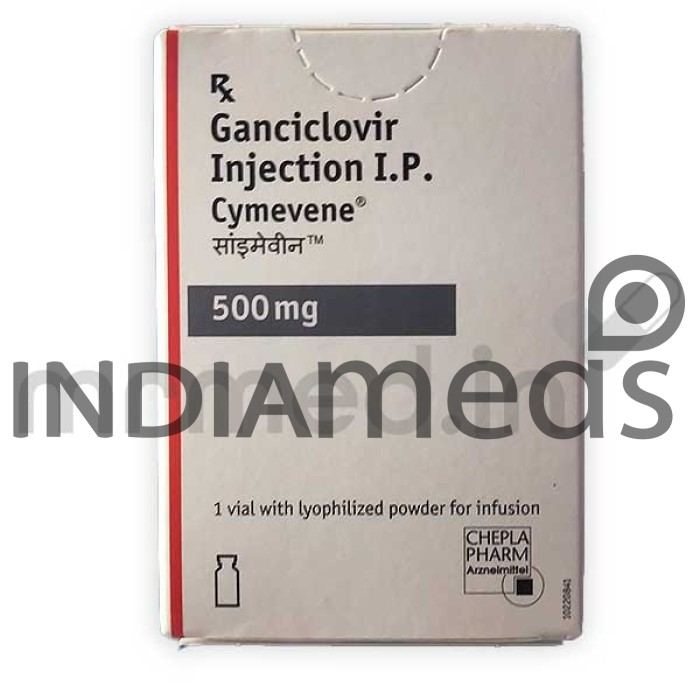Cymevene 500mg Injection contains the active ingredient Ganciclovir. It is used to treat and prevent cytomegalovirus (CMV) infections. It is used to treat CMV infections in AIDS patients and prevent CMV infections in people who received an organ transplant from someone infected with this virus. Cytomegalovirus can affect anyone but is mainly seen in people with a weak immune system. It can affect any part of the body, including the retina at the back of the eye, causing eye problems.
Tell your doctor if you have kidney disorders, allergic conditions, or are undergoing radiotherapy or hemodialysis before taking Cymevene 500mg Injection. Use effective birth control during the treatment and for at least 30 days after the last dose if you are a woman or for at least 90 days after the last dose if you are a man. Ensure you inform your physician of all the medicines, including supplements and herbal medicines, you are taking before you start treatment with this medication. It should be avoided in individuals with pre-existing severe bone marrow suppression or those with low blood cell counts.
Therapeutic Effects of Cymevene 500mg Injection
Pregnancy
Cymevene 500mg Injection is unsafe to use in pregnancy as it can harm the developing fetus.
Breast Feeding
Cymevene 500mg Injection is excreted in breast milk and can harm nursing infants. Breastfeeding should be avoided to prevent any adverse effects on the infant.
Lungs
Cymevene 500mg Injection can adversely affect lung function. It may cause respiratory symptoms such as coughing, shortness of breath, or difficulty breathing.
Liver
Cymevene 500mg Injection can adversely affect liver function. It is better to take caution when using it in individuals with pre-existing liver conditions or impaired liver function. Close monitoring of liver enzymes and overall liver function is recommended during the treatment.
Alcohol
It is generally recommended to avoid excessive alcohol consumption while taking Cymevene 500mg Injection or any medication. Alcohol can interact with this medication and affect liver function.
Driving
People may experience side effects, including dizziness, drowsiness, or fatigue while taking Cymevene 500mg Injection. In that case, avoid driving or operating heavy machinery.
Serious:
- Bone marrow suppression (decrease in blood cell counts)
- Increased risk of infections
- Anemia
- Bleeding
- Kidney toxicity
- Neurotoxicity (confusion, hallucinations, seizures, and tremors)
- Uveitis (inflammation of the uvea)
- Optic neuritis (inflammation of the optic nerve)
- Retinal detachment
Common:
- Upper respiratory tract infection
- Loss of appetite
- Headache
- Cough
- Short of breath
- Diarrhea
- Tiredness
- Fever
- Thrush and oral thrush
- Nausea
Cymevene 500mg Injection can be used in individuals with HIV, particularly for treating CMV retinitis. However, it should be used under a healthcare professional's guidance, considering the individual's health status and other factors.
Cymevene 500mg Injection has the potential to impair fertility. However, the extent and reversibility of fertility problems can vary among individuals. It is advisable to discuss concerns about fertility issues with a healthcare professional.
Cymevene 500mg Injection use in elderly individuals may require closer monitoring due to age-related changes in kidney function and potential comorbidities. Pediatric use of this medication requires careful dosing adjustments based on age and weight
If you experience any eye-related symptoms, such as eye pain, redness, vision changes, or other concerning ocular effects, it is important to seek immediate medical attention. Prompt evaluation by an ophthalmologist is crucial to determine the appropriate management.
Individuals with a history of uveitis or optic neuritis should exercise caution when using Cymevene 500mg Injection, as it can potentially worsen these conditions. Close monitoring and evaluation by an ophthalmologist are important for managing ocular effects.
The concomitant use of Cymevene 500mg Injection with other antiviral medications, such as didanosine, may increase the risk of toxicity
Individuals with a history of blood disorders should be closely monitored while taking Cymevene 500mg Injection due to the potential risk of bone marrow suppression. In such cases, regular blood tests and close communication with a healthcare professional are important.
Cymevene 500mg Injection has the potential to affect glucose levels and may require close monitoring in individuals with diabetes. Regular blood glucose monitoring and consultation with a healthcare professional are recommended for appropriate diabetes management while taking it.
Molecule name: Ganciclovir | Therapeutic class: Antiviral agents |
Pharmacological class: Nucleoside analogs | Indications: Cytomegalovirus infection |





